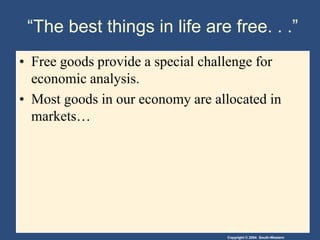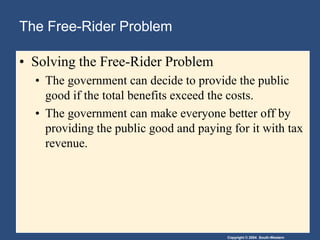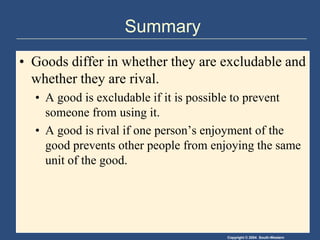Public goods
- 1. 11Public Goods and Common Resource
- 2. “The best things in life are free. . .”Free goods provide a special challenge for economic analysis.Most goods in our economy are allocated in markets…
- 3. “The best things in life are free. . .”When goods are available free of charge, the market forces that normally allocate resources in our economy are absent.
- 4. “The best things in life are free. . .”When a good does not have a price attached to it, private markets cannot ensure that the good is produced and consumed in the proper amounts.
- 5. “The best things in life are free. . .”In such cases, government policy can potentially remedy the market failure that results, and raise economic well-being.
- 6. THE DIFFERENT KINDS OF GOODSWhen thinking about the various goods in the economy, it is useful to group them according to two characteristics: Is the good excludable? Is the good rival?
- 7. THE DIFFERENT KINDS OF GOODS ExcludabilityExcludability refers to the property of a good whereby a person can be prevented from using it.RivalryRivalry refers to the property of a good whereby one person’s use diminishes other people’s use.
- 8. THE DIFFERENT KINDS OF GOODSFour Types of GoodsPrivate GoodsPublic GoodsCommon ResourcesNatural Monopolies
- 9. THE DIFFERENT KINDS OF GOODSPrivate GoodsAre both excludable and rival.Public GoodsAre neither excludable nor rival.Common ResourcesAre rival but not excludable.Natural MonopoliesAre excludable but not rival.
- 10. •Ice-cream cones•Fire protection•Clothing•Cable TV•Congested toll roads•Uncongested toll roads•Fish in the ocean•Tornado siren•The environment•National defense•Congested nontoll roads•Uncongested nontoll roadsFigure 1 Four Types of GoodsRival?YesNoPrivate GoodsNatural MonopoliesYesExcludable?Common ResourcesPublic GoodsNoCopyright © 2004 South-Western
- 11. PUBLIC GOODSA free-rider is a person who receives the benefit of a good but avoids paying for it.
- 12. The Free-Rider ProblemSince people cannot be excluded from enjoying the benefits of a public good, individuals may withhold paying for the good hoping that others will pay for it.The free-rider problem prevents private markets from supplying public goods.
- 13. The Free-Rider Problem Solving the Free-Rider ProblemThe government can decide to provide the public good if the total benefits exceed the costs.The government can make everyone better off by providing the public good and paying for it with tax revenue.
- 14. Some Important Public GoodsNational DefenseBasic ResearchFighting Poverty
- 15. CASE STUDY: Are Lighthouses Public Goods?
- 16. The Difficult Job of Cost-Benefit AnalysisCost benefit analysis refers to a study that compares the costs and benefits to society of providing a public good.In order to decide whether to provide a public good or not, the total benefits of all those who use the good must be compared to the costs of providing and maintaining the public good.
- 17. The Difficult Job of Cost-Benefit AnalysisA cost-benefit analysis would be used to estimate the total costs and benefits of the project to society as a whole.It is difficult to do because of the absence of prices needed to estimate social benefits and resource costs.The value of life, the consumer’s time, and aesthetics are difficult to assess.
- 18. COMMON RESOURCESCommon resources, like public goods, are not excludable. They are available free of charge to anyone who wishes to use them.
- 19. COMMON RESOURCESCommon resources are rival goods because one person’s use of the common resource reduces other people’s use.
- 20. Tragedy of the CommonsThe Tragedy of the Commons is a parable that illustrates why common resources get used more than is desirable from the standpoint of society as a whole.Common resources tend to be used excessively when individuals are not charged for their usage. This is similar to a negative externality.
- 21. Some Important Common ResourcesClean air and waterCongested roadsFish, whales, and other wildlife
- 22. CASE STUDY: Why Isn’t the Cow Extinct?Will the market protect me?PrivateOwnership and the Profit Motive!
- 23. CONCLUSION: THE IMPORTANCE OF PROPERTY RIGHTSThe market fails to allocate resources efficiently when property rights are not well-established (i.e. some item of value does not have an owner with the legal authority to control it).
- 24. CONCLUSION: THE IMPORTANCE OF PROPERTY RIGHTSWhen the absence of property rights causes a market failure, the government can potentially solve the problem.
- 25. SummaryGoods differ in whether they are excludable and whether they are rival.A good is excludable if it is possible to prevent someone from using it.A good is rival if one person’s enjoyment of the good prevents other people from enjoying the same unit of the good.
- 26. SummaryPublic goods are neither rival nor excludable.Because people are not charged for their use of public goods, they have an incentive to free ride when the good is provided privately.Governments provide public goods, making quantity decisions based upon cost-benefit analysis.
- 27. SummaryCommon resources are rival but not excludable.Because people are not charged for their use of common resources, they tend to use them excessively.Governments tend to try to limit the use of common resources.



























